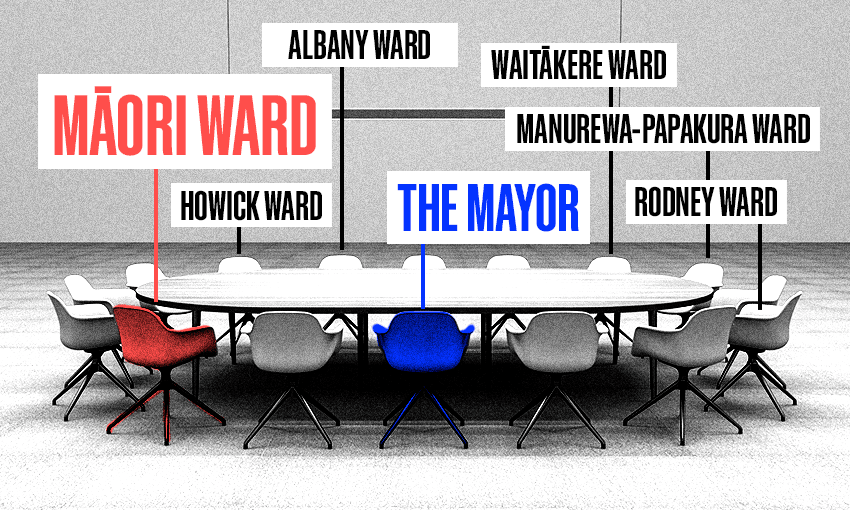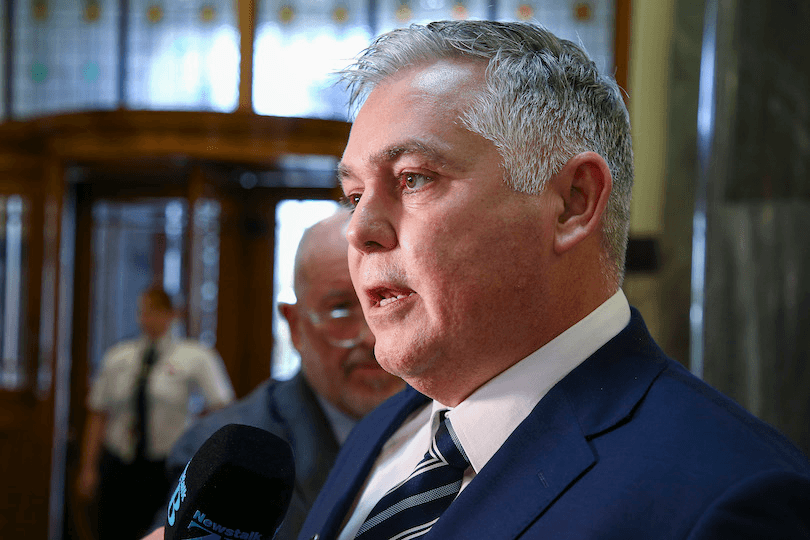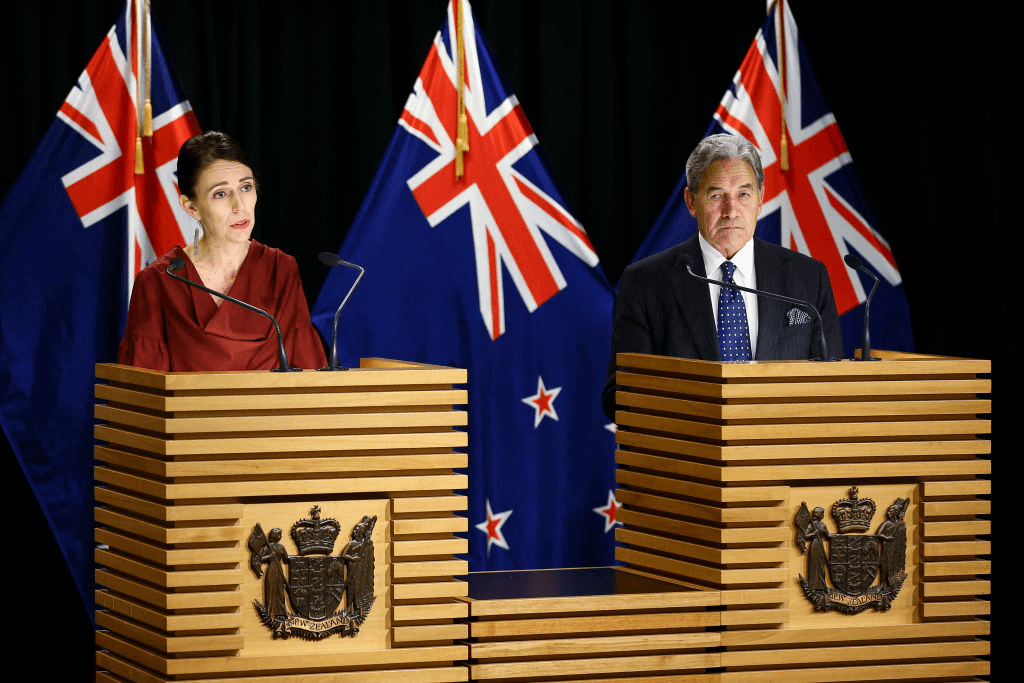Duncan Greive hits the studio to analyse what’s driving the shock decision to end Three’s popular and successful 7pm news-entertainment hybrid The Project. He digs into recent ratings and explains the history and function of 7pm shows in New Zealand, then imagines what might come next from the digital-first direction hinted at in an email from Newshub’s Sarah Bristow.
Our future depends on
your support.LIVE UPDATES
Wellington goes against Auckland: regional council votes for new ‘Māori constituency’
While Auckland Council has voted down a proposal for new Māori seats, Wellington has opted for a different direction.
The Greater Wellington regional council has agreed to establish a Māori constituency in time for the 2025 local elections. It will mean, according to the council’s Te Tiriti o Waitangi Komiti chair Hikitia Ropata, a permanent place for a Māori voice at the regional governance table.
“Today’s decision is an important step forward in honouring Te Tiriti o Waitangi, ensuring the voices of mana whenua and mātāwaka will be heard, embedded, and carried forward by future councils and their decisions,” said Ropata.
Greater Wellington chair Daran Ponter said this was the right decision for council. “We are joining the many councils across Aotearoa who have welcomed a Māori constituency in recent years, as we continue to build strong, equitable partnerships with mana whenua,” Ponter said.
“We understand our obligations under Te Tiriti go beyond establishing this constituency, and we expect the councillor who represents it will help us honour those commitments.”
Auckland Council votes down Māori wards proposal
Auckland Council has rejected introducing Māori seats at its table. Consequently, Auckland won’t have any Māori wards for the 2025 local body election, compared to just under half of New Zealand’s 78 councils which will have the indigenous representation.
Whau ward councillor and Māori outcomes portfolio holder Kerrin Leoni said it was a “sad day for Māori”. In contrast, Howick ward councillor Sharon Stewart said it would be foolish to establish the indigenous seats while the council attempted to streamline its operations by minimising the number of councillors and local boards.
Today’s councillor vote followed public consultation through August and September. Leoni told The Spinoff in early September that consultation submissions were largely against Māori seats. That perspective continued throughout the consultation, ultimately with most submissions being against. Although a majority of Māori submitters were in favour, the majority of tauiwi weren’t. In 2021, 18 of Auckland’s 21 local boards endorsed Māori wards, and former mayor Phil Goff’s council endorsed them in-principle.
Gutted. Sorry whanau, we really did our best today to get Maori wards over the line for 2025 but it wasn't enough. Thanks for the supportive messages
— Cr Shane Henderson (@HendoWest) October 26, 2023
The outcome of today’s vote was 11 votes against, nine votes for one and one abstention (mayor Wayne Brown). The voting was split down pre-existing council factional lines, with so-called progressive councillors voting for and so-called conservative councillors voting against.
Those who voted in favour were:
- Alf Filipaina (Manukau ward)
- Angela Dalton (Manurewa-Papakura ward)
- Chris Darby (North Shore ward)
- Josephine Bartley (Maungakiekie-Tāmaki ward)
- Julie Fairey (Albert-Eden-Puketāpapa ward)
- Kerrin Leoni (Whau ward)
- Lotu Fuli (Manukau ward)
- Richard Hills (North Shore ward)
- Shane Henderson (Waitakere ward)
Those who voted against were:
- Andy Baker (Franklin ward)
- Christine Fletcher (Albert-Eden-Puketāpapa ward)
- Daniel Newman (Manurewa-Papakura ward)
- Desley Simpson (Ōrākei ward)
- Greg Sayers (Rodney ward)
- John Watson (Albany ward)
- Ken Turner (Waitakere ward)
- Mike Lee (Waitematā and Gulf ward)
- Sharon Stewart (Howick ward)
- Wayne Walker (Albany ward)
- Maurice Williamson (Howick ward)
The vote’s outcome doesn’t mean that Māori wards are entirely off the table in Auckland though – they’re only being rejected for now. “This doesn’t mean Auckland Council says ‘no’ to Māori wards. We want to get this right from the start to ensure we are creating a legacy everyone in our city can be proud of,” said mayor Brown. Today’s vote deferred the final decision about Auckland’s Māori seats to a council governance working group, which will report back to the council at-large in December 2024. However, if the working group does endorse Māori wards, they wouldn’t be able to be legally set up until the 2028 local body elections.
Our nation’s biggest city – with the largest population of Māori – will be without Māori wards for at least another half decade.
Creative New Zealand adapting to ‘prospect’ of less revenue to invest in arts
Stephen Wainwright, the chief executive of Creative New Zealand, has indicated in a blog post today that the organisation was adapting to the “prospect of materially less revenue” to invest in the arts sector from July 2024.
Wainwright indicated that this financial planning was shaped by three factors: the “tight fiscal environment”, the end of Covid-19 funding, and signalled changes to the way the New Zealand Lottery Grants Board Te Puna Tahua (NZLGB) allocated funding to CNZ. He stated that the organisation had also seen “record demand” for services and funding in recent times.
CNZ has a mix of revenue sources, through the government and NZLGB, which usually makes up about 70-75% of its overall funding, although Covid-19 funding injections from the government has shifted that share.
Other than this funding, there has been no significant change to CNZ’s baseline government funding (roughly $16-17m) since the mid-2000s. On the other hand, the funding from the NZLGB has risen as lottery profits have risen, from $21m in 2006 to $54m in 2022/23.
Historically, this funding has been allocated via a percentage share, but NZLGB recently advised the organisation that a set amount will instead be allocated, and based on forecasts, that amount will be $49.5m – about $5m less. The organisation is also “not guaranteed” a share in any forecast profits.
“To maintain our current service levels – which should help lessen the immediate impact on the sector – the Arts Council has agreed to use some of its reserves to cushion the blow this year,” Wainwright said. “Creative New Zealand does not have the financial reserves to continue doing this.”
The organisation will be “looking hard” at its own costs, in keeping with government guidance, but aligning to its commitment that as much money as possible is invested into the sector.
Three’s The Project on its last legs
Three’s weekday 7pm show The Project is set to be cancelled and replaced in the new year.
Warner Bros Discovery said it had launched consultation to discontinue The Project from the end of the year. “Our primary focus is to support our people as we work through this process,” a spokesperson said.
Sarah Bristow, the outgoing head of news for Warner Bros Discovery in Auckland, told the Newshub team in an email that a “redefined news show” would take over the 7pm slot if the proposed change was confirmed.
“The Project has served Newshub and Three incredibly well since its commission back in 2017, however audience behaviour has changed dramatically since that time,” she said.
“This year, we have discussed at length why we are transitioning our broadcast business to a digitally-led operating model and the transformation of our newsroom is equally crucial as we move away from a model that has centred around linear broadcasting and programme deadlines to one that is more responsive to audience needs across the day.”
All areas of the business were being reviewed to “reimagine what our on-air news offering would look like, if we were to build it again from the ground up” with a focus on capturing digital audiences and driving online engagement. Patrick Gower’s new weekly news show Paddy Gower Has Issues was cited as an example of this.
There are no proposed format changes to other Newshub shows.
RNZ’s Mediawatch has reported that The Project will be off-air tonight as “staff digest the news”.
An emerging drama over TVNZ’s commitment to drama
While TVNZ should be very proud of After the Party – read our very positive review here – there are signs that it may not be the start of a new golden age. The show came out of Te Puna Kairangi, a Covid-era government fund that has lapsed, and the powerful rebates underneath it will also be scrutinised by the incoming coalition. Some have also questioned TVNZ’s ongoing commitment to drama after it recently disestablished a key commissioning role. Well-read local screen newsletter Shownews asked pointedly, “if, a little over a year ago, two people were required to do the job, what’s changed at TVNZ that they now only need one?” It suggested TVNZ’s state ownership meant it could run at a loss.
Shownews also voiced a rumour circulating that some NZ On Air-funded content was being delayed until the next financial year purely to make this year’s bleak results look better. A TVNZ spokesperson confirmed this to The Spinoff’s Rec Room newsletter, saying, “we’ve had to make some changes in the short-term to reduce our costs… This includes deferring a small number of titles into the new year.” But they pushed back hard on the idea that it is backing away from commissioning. “Shownews’ perspective that we are not committed to local content or should run at a loss because we’d be bailed out by the government is not accurate,” they said.
The general bad vibe in the air for local TV was echoed in a recent note from screen production guild SPADA’s president Irene Gardiner, who noted that “Three’s budget for local commissioning has been lean for a while, and now TVNZ’s will also be tight.” One further big move at TVNZ: former head of content Cate Calver was yesterday announced as the new CEO of production powerhouse Great Southern.
This is taken from The Spinoff’s pop culture and media newsletter Rec Room, written by Duncan Greive – a new edition drops tomorrow with news of a major new campaign impacting the international streamers. subscribe below:
National may make gang members cover face tattoos with foundation
National would consider banning gang facial tattoos if a planned ban on gang patches doesn’t work.
Mark Mitchell, who is the party’s police spokesperson and likely to become police minister, told RNZ’s Checkpoint that National would send a “very clear signal” to gang members that their symbols would no longer be acceptable.
“We are not going to tolerate gang patches and gang insignia… what they’re used for and what they signify… is quite simply the intimidation of members of the public,” he said.
But while gang patches are one thing, a symbol that’s physically tattooed is another. Mitchell suggested make-up may have to be used.
“The Australians passed a law whereby now gang members have to wake up in the morning and they have to apply foundation to cover offensive tattoos that they have put on their faces to again, try and intimidate members of the public,” he said.
“So if the gangs think that they’re going to get around a ban on gang patches by having swastikas and offensive tattoos on their faces, then we’ll take action to curb that.”
The Bulletin: Hope for cross-party consensus on climate adaptation
The third leg of the resource management act reforms was meant to be a climate adaptation bill to deal with, among other things, the thorny issue of managed retreat. As a member of the expert working group on managed retreat said, “adapting to climate change may prove to be the most costly, complex, and enduring challenge that humanity has ever encountered.” The bill never eventuated but was championed by Green party co-leader James Shaw, and he initiated an inquiry into the issue just before parliament rose before the election.
As Newsroom Pro’s Jono Milne reports, parliamentary business lapses at the dissolution of parliament and the fate of that inquiry now lies with the incoming government. When asked about it by Newsroom, both Christopher Luxon and David Seymour made supportive comments about the inquiry and crossparty approach to climate adaptation. The comments from Luxon and Seymour come as data from reinsurer Swiss Re reveals the global insurance sector is holding an estimated $50b of losses for the first half of this year. Flooding in New Zealand is cited as one of the contributors. Lloyds of London has warned that the full impact of climate change has yet to translate into claims data despite those losses. At a recent event, the company’s director of portfolio risk management said, “By the time we can definitely see the impact in claims, it will be too late.”
Want to read The Bulletin in full? Click here to subscribe and join over 38,000 New Zealanders who start each weekday with the biggest stories in politics, business, media and culture.
Peters condemned for ‘misinformation’ in ‘bizarre’ tweet about March 15
The Labour Party has condemned “bizarre” tweets by New Zealand First leader Winston Peters in which he claims to have been kept in the dark about events on March 15, 2019.
Peters, who was deputy prime minister on the day of terror attack, suggested he and others were never informed that the terrorist had emailed his manifesto to the Beehive minutes before entering the first of two Christchurch mosques.
“Jacinda Ardern should be called to the hearing and asked to explain this appalling lack of transparency to the New Zealand public – let alone to the deputy prime minister and government coalition partner,” he tweeted.
Peters’ comments are false, given the existence of the email was shared with the public at a press conference on March 16 – the day after the attack. A community note has since corrected Peters’ assertion, but because of the political vacuum following the election, the tweet is leading most major news sites this morning.
A spokesperson for outgoing prime minister Chris Hipkins told media the tweet was “completely inaccurate” and that “Peters should remove the tweet and post a correction”.
In a follow-up, Peters doubled down: “For those political apologists and feckless media, there is an existing transcript of a phone call made by the prime minister to the deputy prime minister at the vital time of a crisis when a terrorist had just massacred innocent people. Not once were we transparently informed of this information – such as the phone call her office made to the police – despite the obvious expectation and clear opportunity.”
Speaking to RNZ’s First Up this morning, deputy prime minister Carmel Sepuloni called the tweets bizarre. “I would hope that Winston would apologise for those tweets because they are misinformation. Jacinda didn’t try and hide anything,” she said, adding that she wasn’t holding out hope for an apology.
New Zealand First is currently in ongoing coalition talks with National and Act ahead of the special vote count being revealed on November 3. The Spinoff has approached the leaders of both parties for comment on Peters’ tweets.



